ENGLISH
Für Deutsch bitte nach unten rollen!
If you dig around under the floorboards in old buildings, you may come across some cool treasures. They may not necessarily be of monetary value, but they may take you on a journey back in time. That was the case with this ancient sheet of Neues Deutschland newspaper from September 30th, 1968.
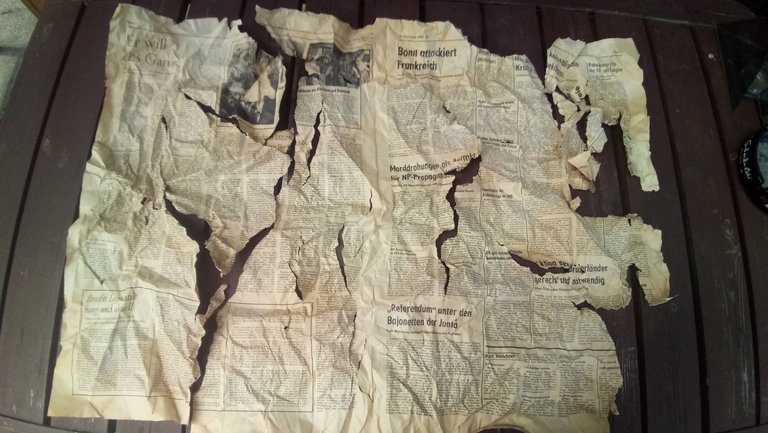
For those who do not know this publication, the nd was the official paper of the GDR regime at the time, meaning it was THE newspaper that had to be read in East Germany... or at least protruded demonstratively from the mailbox. So I was quite excited to get some insight into this no longer existing world on my journey through time.
Culture before World Events
Seeing page 4 being dedicated to culture, just before the political news form around the world on page 5, clearly shows the paper's priority in terms of what's considered more important. On a closer look the expectable is also made abundantly obvious: We are in the middle of a class struggle, which we are about to win - thanks to a highly praised TV-novel (series?) by Helmut Sakowski, and the Berthold Brecht Theater visiting the Soviet Union.
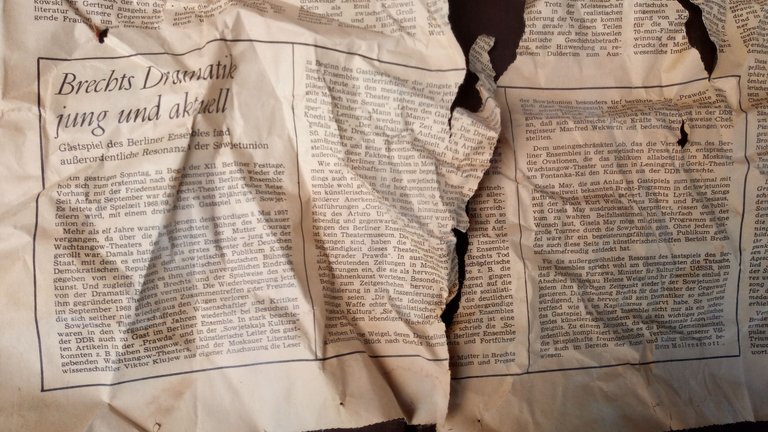
What appealed to me much more was the coverage of world events from that day of the notorious year of 1968 when so much happened in the world. Cultural Revolution in China, Prague Spring, political assassinations and elections in the USA, etc. Of course, not everything happened on the same day, but hardly any of these major world events are mentioned here. However, there is an article to the student movement in Mexico, where it is said that the students were demanding, among other things, the resignation of the mayor of Mexico City and the withdrawal of the army from the universities. As we know, just two days later it came to the bloody Tlatelolco massacre in which hundreds of unarmed civilians were murdered by government agents.
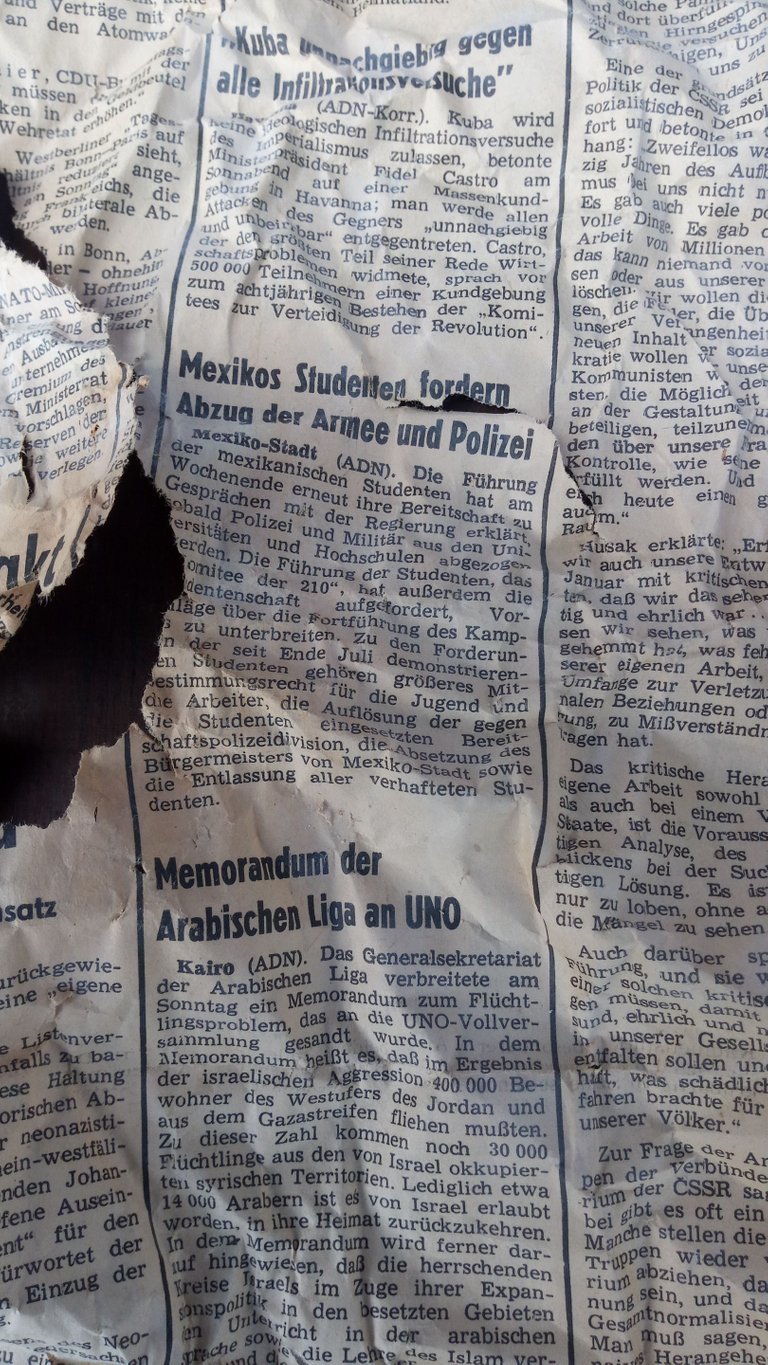
The Prague Spring is mentioned indirectly in the article about Bonn attacking Paris (verbally), regarding adding to NATO's strength, which is claimed to have caused the counter revolution in Prague. Another article talks about the draconian ways how Greeks are forced into a "pseudo referendum" (probably by a pro-capitalist regime). Though the question they are supposed to answer with yes or no, we can only guess. Sure, you can now point your finger at the one-sided, biased reporting of the GDR, but what strikes me most is how similar the whole thing is to today's news!
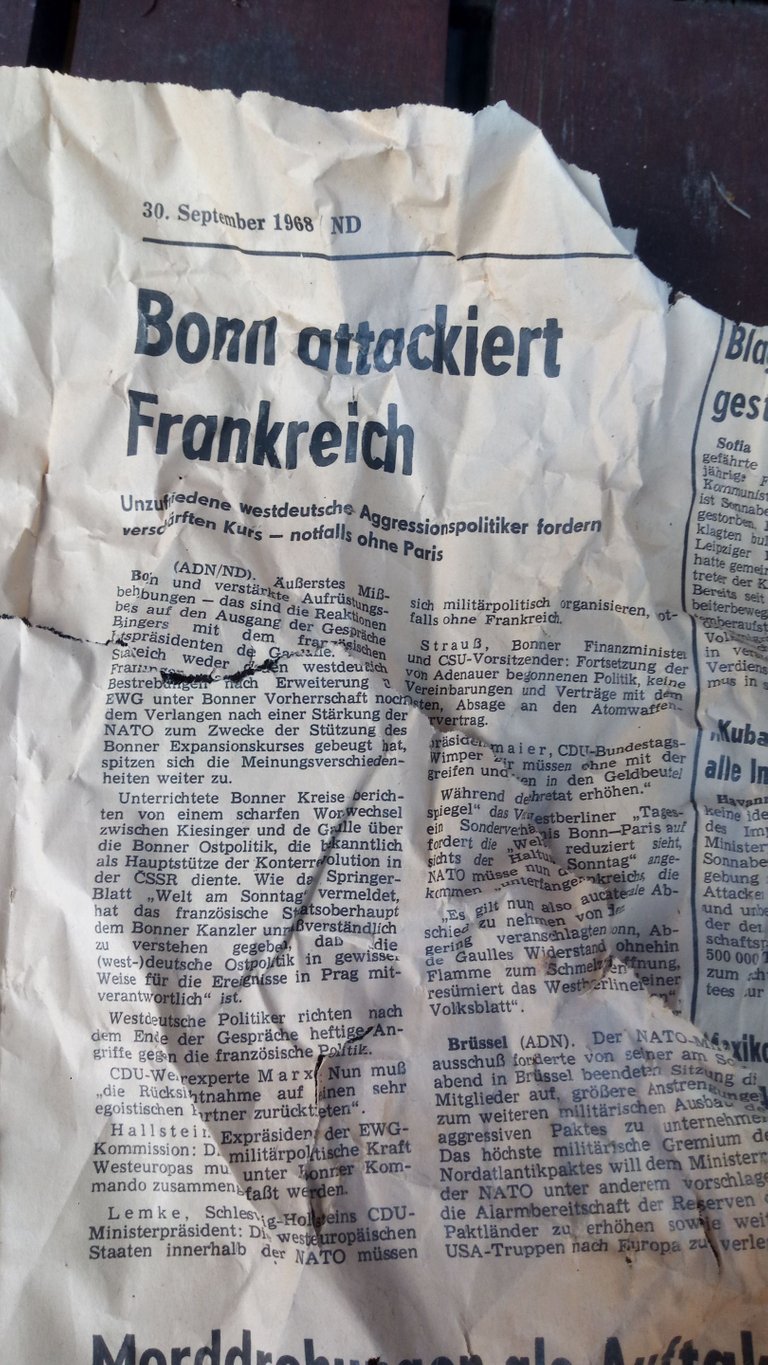
In Lighter News
When I turn this tattered piece of paper over, there is an even less earth-shattering piece of news on page 3, though it does keep going on forever: A health resort is to be made more attractive for visitors, which, however, is facing organizational hurdles. The obvious solution is to encourage the citizens themselves to lend a hand and clean up the town on their own. This is even accompanied by a cartoon, completely without irony or satire, and it's not even that funny (as much as the story itself), just cute: Following the example of the beautiful concrete panel buildings, young and old help out with the construction. How nice!
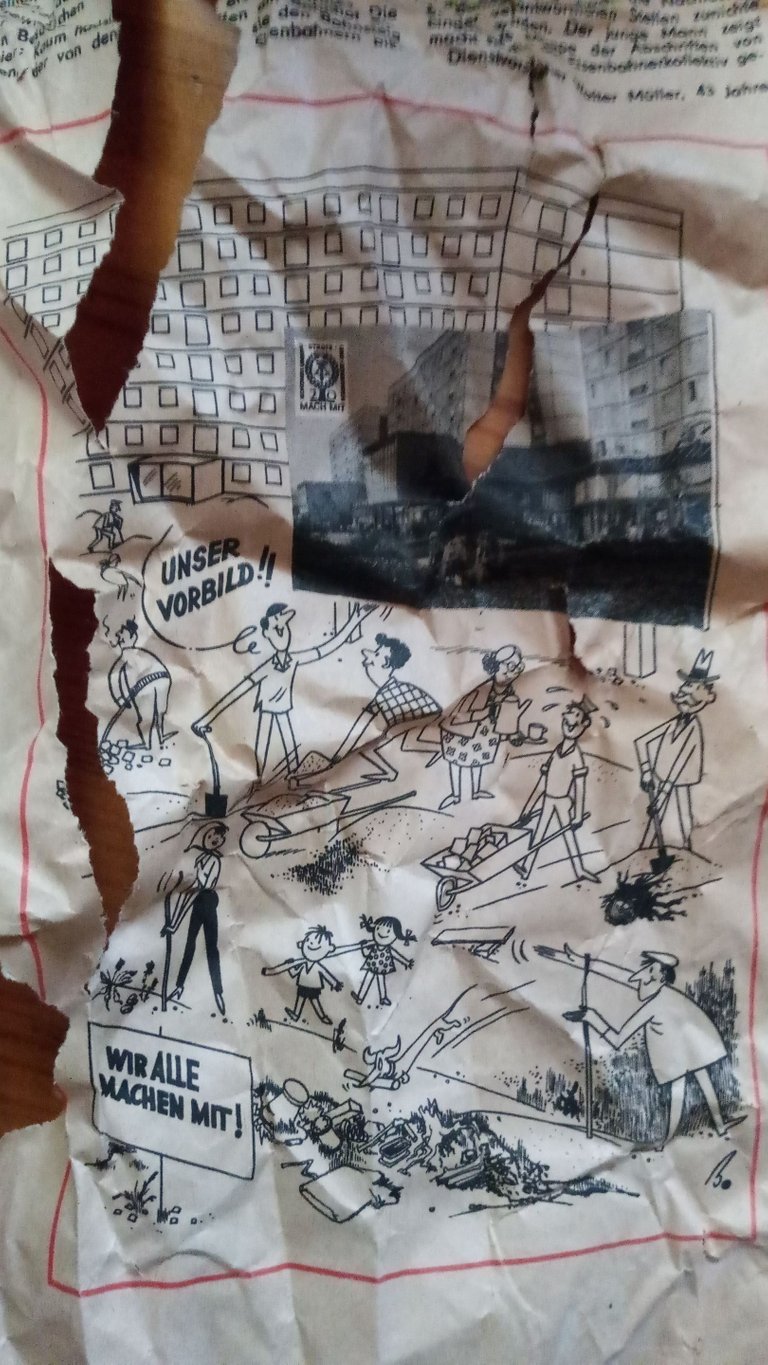
Ads According to Socialist Norm
No newspaper can be complete without advertisement, even if in a communist country. Of course, when it comes to commercial propaganda nothing can hold a candle to the capitalists. Still, the intention is there, with considerable results. For example, you can fly to Moscow with Aeroflot in only 120 minutes, experiencing Russian hospitality. Nice, but I wonder how many readers were actually allowed to board such a flight, not to mention had the desire to do so. Or how about the ad for automatic condensate and liquid conveyor? Unless you are a huge heavy industrial enterprise (meaning exclusively the GDR government), this ad will hardly catch your attention. However, if you happen to own a camping trailer (again, I wonder how common that was in 1968), then the association of German consumer cooperatives will be happy to buy it from you.
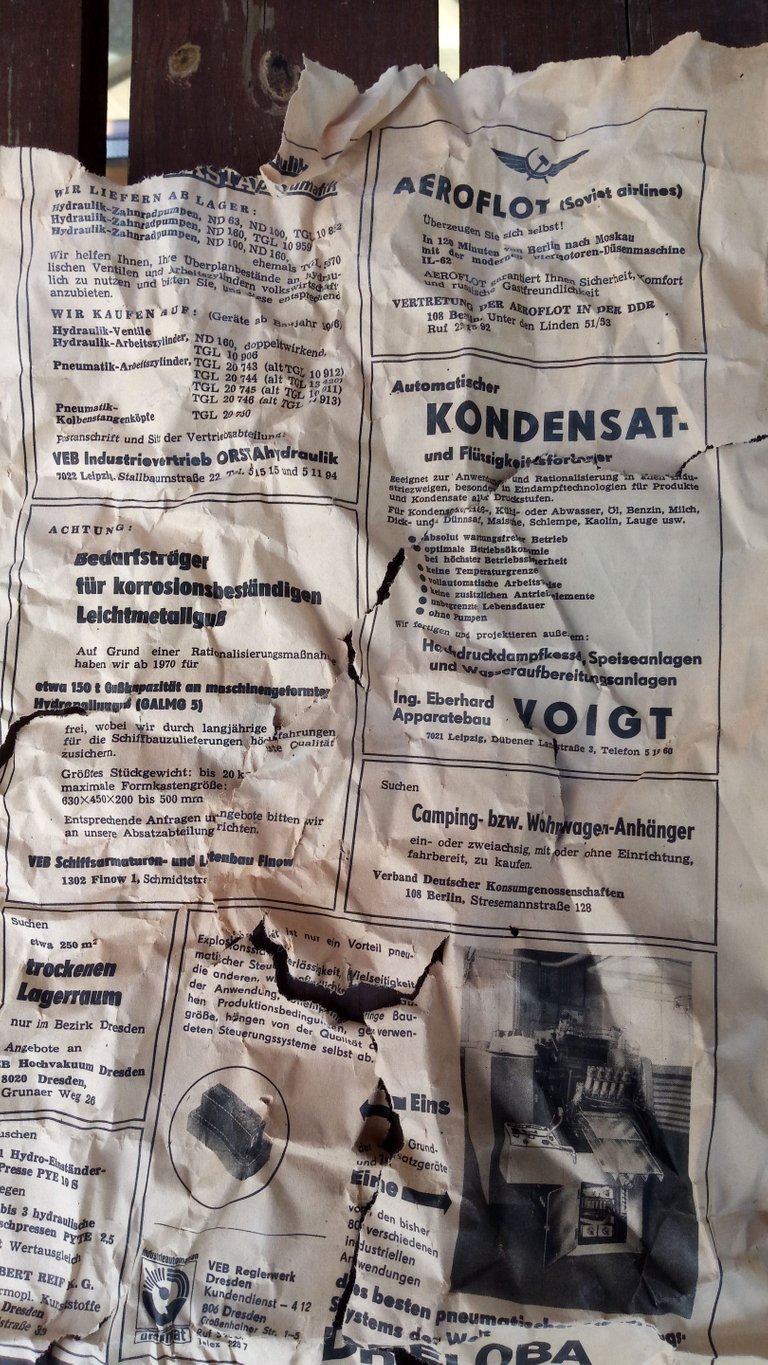
More News on Demand
Well, I think this should be enough to give you a little impression of the largest East German daily newspaper. However, if you liked it so much that you want to know more, and you think you suspect something interesting in my photos, please let me know in the comments. I want to save these old scraps of paper for a bit longer before stuffing them under my own floorboards. On request, I can also take new photos of certain articles, smooth out the paper as best I can, zoom in, maybe even translate the text. After all, we want to fully enjoy this opportunity of spontaneous historical research. Right?
DEUTSCH
Wer in Altbauten unter den Dielen stöbert, kann auf coole Schätze stoßen. Sie haben möglicherweise nicht unbedingt einen monetären Wert, aber sie können einen auf eine kleine Zeitreise mitnehmen. Das war der Fall bei diesem alten Blatt der Zeitung Neues Deutschland vom 30. September 1968.

Für alle die diese Publikation nicht kennen, das nd war damals das offizielle Blatt des DDR Regimes, also DIE Zeitung, die man in Ostdeutschland zu lesen hatte... oder zumindest demonstrativ aus dem Briefkasten hervorstehen hatte. Somit war ich recht gespannt, in meiner Zeitreise auch etwas Einblick in diese nicht länger existierende Welt zu bekommen.
Kultur vor Weltgeschehnissen
Dass Seite 4 der Kultur gewidmet ist, kurz bevor es auf Seite 5 mit politischen Nachrichten aus aller Welt weitergeht, zeigt deutlich, was die Priorität Zeitung ist in Bezug auf das, was als wichtiger erachtet wird. Bei genauerem Hinsehen wird auch das zu Erwartende deutlich: Wir befinden uns mitten in einem Klassenkampf, den wir gewinnen werden – dank eines hochgelobten TV-Romans (Serie?) von Helmut Sakowski und des Berthold Brecht Theaters zu Besuch in der Sowjetunion.

Was mich viel eher gereizt hat, war die Berichterstattung über die Weltgeschehnisse von diesem Tag des berühmt-berüchtigten Jahres 1968, in dem so viel in der Welt passiert ist. Kulturrevolution in China, Prager Frühling, Politische Morde und Wahlen in den USA, etc. Natürlich ist nicht alles am gleichen Tag passiert, allerdings wird hier kaum etwas von diesen großen Weltgeschehnissen erwähnt. Es gibt jedoch einen Beitrag zur Studentenbewegung in Mexiko, wo es heißt, die Studenten forderten unter anderem den Rücktritt des Bürgermeisters von Mexiko Stadt und den Abzug der Armee vom den Universitäten. Wie wir wissen, kam es nur zwei Tage später zu dem blutigen Massaker von Tlatelolco, in dem hunderte von unbewaffneten Zivilisten von Agenten der Regierung ermordet wurden.

Der Prager Frühling wird indirekt in dem Artikel erwähnt, bezüglich des (verbalen) Angriffes von Bonn auf Paris, über die Stärkung der NATO, die angeblich die Konterrevolution in Prag ausgelöst hat. In einem anderen Artikel geht es um die drakonische Art und Weise, wie Griechen (von einem wahrscheinlich prokapitalistischen Regime) zu einem „Pseudo-Referendum“ gezwungen werden. Die Frage, die sie mit Ja oder Nein beantworten sollen, können wir jedoch nur vermuten. Klar, man darf jetzt ruhig den Finger auf die einseitig voreingenommene Berichterstattung der DDR zeigen, aber was mir vor allem auffällt, ist wie sehr das ganze heutigen Nachrichten ähnelt!

In Leichteren Nachrichten
Wenn ich dieses zerfläderte Blatt Papier umdrehe, gibt es auf Seite 3 eine noch weniger weltbewegende Nachricht, worüber allerdings ewig gefaselt wird: Ein Kurort soll für Besucher attraktiver gemacht werden, was allerdings an organisatorischen Hürden scheitert. Die einleuchtende Lösung ist, die Bürger zum mitmachen zu animieren, um selber Hand anzulegen, und das Städtchen herauszuputzen. Dies wird sogar mit einem Cartoon untermalt, ganz ohne Ironie oder Satire, und ist nicht einmal so witzig (wie die Story selbst), nur eben putzig: Ja, nach dem Vorbild der schönen Plattenbauten helfen jung und alt beim Bau mit. Wie nett!

Werbung nach Sozialistischer Norm
Keine Zeitung kann ohne Werbung vollständig sein, selbst in einem kommunistischen Land. Wenn es um Kommerzropaganda geht, kann den Kapitalisten natürlich nichts das Wasser reichen. Dennoch ist die Absicht da, mit beachtlichen Ergebnissen. Mit Aeroflot können Sie beispielsweise in nur 120 Minuten nach Moskau fliegen und russische Gastfreundschaft erleben. Schön, aber ich frage mich, wie viele Leser tatsächlich in einen solchen Flug einsteigen durften, ganz zu schweigen davon, ob sie überhaupt den Wunsch dazu hatten. Oder wie wäre es mit der Werbung für automatische Kondensat- und Flüssigkeitsförderer? Sofern man kein großes Schwerindustrieunternehmen ist (also ausschließlich die DDR-Regierung), wird diese Announce kaum die Aufmerksamkeit erregen. Wenn Sie jedoch zufällig einen Wohnwagen besitzen (und wieder ich frage mich, wie verbreitet das im Jahr 1968 war), dann wird Ihnen der Verband Deutscher Konsumgenossenschaften diesen gerne abkaufen.

Auf Anfrage Weitere Nachrichten
So, dies sollte glaube ich reichen, einen kleinen Eindruck von der größten Ostdeutschen Tageszeitung zu geben. Sollte es Euch allerdings so gut gefallen haben, dass Ihr mehr wissen wollt, und ihr in meinen Fotos etwas interessantes zu vermuten glaubt, sagt mir bitte in den Kommentaren bescheid. Ich will diese alten Papierfetzen noch ein bisschen aufbewaren bevor ich sie mir selber unter die Dielen stopfe. Ich kann auf Anfrage auch gerne einige Teile neu fotografieren, das Papier so gut es geht glattstreichen, hineinzoomen, vielleicht sogar den Text übersetzten. Schließlich wollen wir diese Gegebenheit der spontanen Geschichtsforschung voll auskosten. Nicht wahr?
Journey back in time can be really cool, especially the ad and news sections. We have a lot of old newspapers and magazines at the attic of our summer house, but they are not so vintage, rather from 80-90-es.
Oh, just give it some time, they could get super interesting. The more the present changes, the crazier the past becomes.
I agree with you. We burn them in the oven, slowly - but some will definitely live to the distant future and delight our grandchildren.
Nice! Just make sure not to burn the ones they will particularly enjoy! ;-)